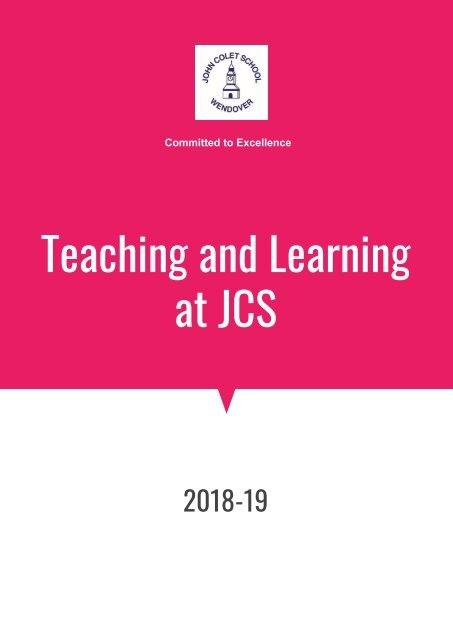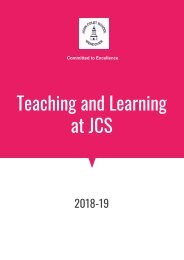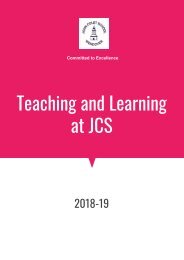Staff info booklet Teaching and Learning at JCS
You also want an ePaper? Increase the reach of your titles
YUMPU automatically turns print PDFs into web optimized ePapers that Google loves.
Committed to Excellence<br />
<strong>Teaching</strong> <strong>and</strong> <strong>Learning</strong><br />
<strong>at</strong> <strong>JCS</strong><br />
2018-19
<strong>Teaching</strong> <strong>and</strong> <strong>Learning</strong> Procedures<br />
<strong>Teaching</strong> <strong>and</strong> <strong>Learning</strong> Methodology<br />
All staff have a responsibility to meet the learning needs of all students through high<br />
quality lessons. <strong>Staff</strong> will actively seek to improve their knowledge <strong>and</strong> skills through<br />
continuous professional development <strong>at</strong> whole school, subject team <strong>and</strong> individual<br />
levels. Collabor<strong>at</strong>ive planning during the Tuesday afternoon directed time slots is a<br />
m<strong>and</strong><strong>at</strong>ory expect<strong>at</strong>ion of all staff th<strong>at</strong> are involved in the learning of students. The<br />
three basic principles of Planning, <strong>Teaching</strong> <strong>and</strong> Assessing will underpin wh<strong>at</strong> staff<br />
do in the classroom (see below for Assessment Procedures)<br />
Responsibilities<br />
Subject Teachers <strong>and</strong> <strong>Learning</strong> Support Assistants have the responsibility to plan,<br />
teach <strong>and</strong> assess for student needs th<strong>at</strong> help to drive their progress. Explicit details of<br />
these can be found in The <strong>JCS</strong> <strong>Learning</strong> Expect<strong>at</strong>ions Document (Appendix 1) . They<br />
should also ensure th<strong>at</strong> they are following the Behaviour, Recognition <strong>and</strong><br />
Consequences guidelines in a fair <strong>and</strong> transparent manner.<br />
Subject Team Leaders <strong>and</strong> the Senior Leadership Team have the responsibility to<br />
quality assure th<strong>at</strong> staff are following the expect<strong>at</strong>ions outlined in The <strong>JCS</strong> <strong>Learning</strong><br />
Expect<strong>at</strong>ions Document (Appendix 1 <strong>and</strong> ensure th<strong>at</strong> they undertake the required<br />
amount of monitoring following the procedures as outlined in Appendix 2 <strong>and</strong> 3.<br />
Reports for SLT <strong>and</strong> Governors will be expected in line with the school calendar of<br />
monitoring.<br />
Students have the responsibility to ensure th<strong>at</strong> they arrive on time to lessons,<br />
equipped <strong>and</strong> ready to contribute to the learning within their classes in a positive<br />
way. They are expected to follow the school behaviour, recognition <strong>and</strong> consequences<br />
<strong>and</strong> the homework procedures.<br />
Parents <strong>and</strong> Carers have the responsibility to ensure th<strong>at</strong> their child is ready to learn<br />
with the correct equipment for school, including homework completed to the<br />
expected st<strong>and</strong>ard.
Homework<br />
Homework refers to tasks given to pupils by their teachers to be completed outside of usual lessons.<br />
Common homework activities may be reading or preparing for work to be done in class, or practising<br />
<strong>and</strong> completing tasks or activities already taught or started in lessons In addition, it may include more<br />
extended activities to develop inquiry skills or more directed <strong>and</strong> focused work such as revision for<br />
exams. On average, the impact of homework on learning is consistently positive (leading to on average<br />
five months' additional progress).<br />
Responsibilities<br />
Subject Teachers have the responsibility to set regular, appropri<strong>at</strong>e homework <strong>and</strong> deadlines to meet<br />
the needs of their students. This will be recorded on www.showmyhomework.co.uk on the day th<strong>at</strong> the<br />
work is set, with clear timings to guide the student. A minimum of 2 nights are allowed to complete the<br />
task set. Subject Teachers are also responsible for assessing <strong>and</strong> giving appropri<strong>at</strong>e feedback to help<br />
the progress of the student. Any missed homework deadlines will be recorded on SIMS <strong>and</strong> escal<strong>at</strong>e to<br />
STL if this occurs more than once.<br />
Subject Team Leaders have the responsibility to monitor the quality <strong>and</strong> quantity of the homework set<br />
for each year group within their department <strong>and</strong> hold Subject Teachers to account if there is an issue.<br />
This may be monitored in conjunction with the Heads of Year. Subject Team Leaders are expected to<br />
make phone calls home if persistent deadlines are missed.<br />
The Senior Leadership Team has the responsibility monitor, through work sampling the effectiveness<br />
of departmental procedures. The Senior Leadership Team will discuss students who persistently fail to<br />
h<strong>and</strong> in homework on time every two weeks <strong>and</strong> make phone calls home to students of concern.<br />
Students have the responsibility to ensure th<strong>at</strong> they check www.showmyhomework.co.uk every night to<br />
ensure th<strong>at</strong> they underst<strong>and</strong> the task <strong>and</strong> can meet the deadline. Students should <strong>at</strong>tempt all tasks,<br />
complete the work to the best of their ability <strong>and</strong> <strong>info</strong>rm the teacher of any issues in advance of the<br />
deadline. Students are expected to c<strong>at</strong>ch up on missed homework if they were absent when the work<br />
was set.<br />
Parents are responsible for supporting the school in ensuring th<strong>at</strong> homework is completed to the<br />
expected st<strong>and</strong>ard <strong>and</strong> it is h<strong>and</strong>ed in on time. The student should be provided with a suitable place to<br />
conduct home study, such as a quiet space (no mobile phones) <strong>and</strong> a desk. The Subject Teacher<br />
should be contacted if there is a problem with the task set.<br />
Dur<strong>at</strong>ion of Homework<br />
In Key Stage 3, the homework set by each subject should last approxim<strong>at</strong>ely 30 minutes per piece<br />
unless st<strong>at</strong>ed otherwise.<br />
In Key Stage 4 the homework set by each subject should last approxim<strong>at</strong>ely 45 minutes per piece<br />
unless st<strong>at</strong>ed otherwise.
Assessment <strong>and</strong> Feedback Procedures<br />
The ‘Elimin<strong>at</strong>ing unnecessary workload around marking’ Report of the Independent<br />
Teacher Workload Review Group (March 2016), made clear recommend<strong>at</strong>ions to<br />
schools <strong>and</strong> Ofsted with regards to assessment, marking <strong>and</strong> feedback. The summary<br />
of their report outlined th<strong>at</strong> all marking should be:<br />
●Meaningful: marking varies by age group, subject, <strong>and</strong> wh<strong>at</strong> works best for the pupil<br />
<strong>and</strong> teacher in rel<strong>at</strong>ion to any particular piece of work.<br />
●Manageable: marking practice is proportion<strong>at</strong>e <strong>and</strong> considers the frequency <strong>and</strong><br />
complexity of written feedback, as well as the cost <strong>and</strong> time-effectiveness of marking in<br />
rel<strong>at</strong>ion to the overall workload of teachers.<br />
●Motiv<strong>at</strong>ing: Marking should help to motiv<strong>at</strong>e pupils to progress. This does not mean<br />
always writing in-depth comments or being universally positive: sometimes short,<br />
challenging comments or oral feedback are more effective. Don’t do more work than<br />
the pupils.<br />
Peer/self assessment: Pupil assessment is an important part of metacognition<br />
development. If done well, pupils can reflect on their learning <strong>and</strong> make good progress.<br />
Most pupils will be used to doing this <strong>at</strong> primary school - capitalise on this in Year 7<br />
<strong>and</strong> ensure th<strong>at</strong> Year 7 teachers are using this a part of their practice.<br />
MAD time: This form of assessment is useful because it offers a range of str<strong>at</strong>egies<br />
th<strong>at</strong> allows individualised self reflection to take place. It is important th<strong>at</strong> teachers use<br />
MAD time to not only allow for pupil reflection time, but also to make marking more<br />
manageable.<br />
With both of these str<strong>at</strong>egies, it is important not to fall into the trap of marking again<br />
once you have looked <strong>at</strong> the work: ‘Accepting work th<strong>at</strong> pupils have not checked<br />
sufficiently <strong>and</strong> then providing extensive feedback detracts from pupils’ responsibility<br />
for their own learning, particularly in editing <strong>and</strong> drafting skills. Pupils should be taught<br />
<strong>and</strong> encouraged to check their own work by underst<strong>and</strong>ing the success criteria,<br />
presented in an age appropri<strong>at</strong>e way, so th<strong>at</strong> they complete work to the highest<br />
st<strong>and</strong>ard.’
Form<strong>at</strong>ive Assessment<br />
How do we incorpor<strong>at</strong>e the 3’M’s’?<br />
Form<strong>at</strong>ive: This involves teachers using evidence of pupils’ underst<strong>and</strong>ing <strong>and</strong><br />
learning to make decisions, minute-by-minute <strong>and</strong> day-by-day, about the next<br />
steps in teaching <strong>and</strong> learning. This evidence could also be used when planning<br />
lessons or differenti<strong>at</strong>ing activities for individual pupils. When assessing<br />
form<strong>at</strong>ively, the feedback given by teachers moves learners forward. Students<br />
are developed to be owners of their own learning <strong>and</strong> support each other to<br />
progress.<br />
Wh<strong>at</strong><br />
❏Feedback th<strong>at</strong> enables students to make progress, th<strong>at</strong> without it, they would<br />
not have achieved<br />
Why<br />
❏Encourage progress in skills, knowledge or underst<strong>and</strong>ing<br />
❏Build confidence <strong>and</strong> therefore resilience to difficult challenges<br />
❏To promote ownership of work - with good form<strong>at</strong>ive feedback, students are<br />
responsible for their own learning <strong>and</strong> progress.<br />
❏Opportunity to use therapy to address gaps in knowledge or skills<br />
How<br />
❏‘Not yet’ is used to encourage students to be persevere with learning<br />
❏Written feedback in books to enable progress<br />
❏Verbal feedback (including questioning)<br />
❏Peer feedback<br />
❏Walking Talking Mocks<br />
When<br />
❏Every lesson - written or verbal<br />
❏In depth feedback in books (min. once a half term)<br />
❏On individual basis due to need<br />
Who<br />
❏All students through self <strong>and</strong> peer assessment<br />
❏All staff (Teachers/LSA/HLTA/<strong>Learning</strong> Mentor/Inclusion Manager/HOY)
Summ<strong>at</strong>ive Assessment<br />
The goal of summ<strong>at</strong>ive assessment is to evalu<strong>at</strong>e student learning <strong>at</strong> the end of<br />
an instructional unit by comparing it against some st<strong>and</strong>ard or benchmark.<br />
Wh<strong>at</strong><br />
❏Assessment modelled on the final GCSE form<strong>at</strong> of the subject (eg: exam paper or<br />
CA).<br />
Why<br />
❏Summ<strong>at</strong>ive d<strong>at</strong>a will be used as part of the assessment <strong>and</strong> judgement for LTA<br />
grades.<br />
❏To assess the learning of pupils over <strong>at</strong> least one term of teaching.<br />
❏To identify any gaps in knowledge, underst<strong>and</strong>ing <strong>and</strong> skills.<br />
❏To upd<strong>at</strong>e parents on progress (eg: through parents evenings or reporting).<br />
❏To give students experience of exam conditions <strong>and</strong> the dem<strong>and</strong>s they will face<br />
towards the end of their courses.<br />
❏To ensure th<strong>at</strong> students are clear on the layout, question type, skills etc required<br />
for the subject.<br />
How<br />
❏Marking criteria (eg: PLCs) to be shared with students in advance (eg: <strong>at</strong> the<br />
beginning of a series of lessons).<br />
❏Assessment takes place in exam conditions<br />
❏Departments to st<strong>and</strong>ardise marking before returning papers to students <strong>and</strong><br />
making LTA grades.<br />
When<br />
❏Termly<br />
❏All students in each year group to sit the same task/paper within a 2 week period<br />
prior to the entry of LTA d<strong>at</strong>a.<br />
Who<br />
❏All students<br />
❏All summ<strong>at</strong>ive assessment must be marked by teachers to quality assure pupil<br />
knowledge <strong>and</strong> underst<strong>and</strong>ing.
Lessons are planned to ensure th<strong>at</strong> questioning drives pupil progress. When<br />
planning, staff consider the needs of learners <strong>and</strong> plan their questions accordingly.<br />
Targeted questions are used to stretch, challenge <strong>and</strong> engage the learners in all<br />
John Colet School Classroom Expect<strong>at</strong>ions<br />
These are expect<strong>at</strong>ions for every lesson.<br />
Consistency<br />
Meeting <strong>and</strong> Greeting - staff should meet <strong>and</strong> greet students on entry to the<br />
classroom (perip<strong>at</strong>etic teachers to greet asap). Uniform should be addressed before<br />
students enter the classroom.<br />
Taking the register - this should be done in the first 15 minutes. Any student<br />
arriving l<strong>at</strong>e, minutes of l<strong>at</strong>eness should be added to SIMS.<br />
Se<strong>at</strong>ing Plan - This is a working document; it needs to be legible, not ne<strong>at</strong>!<br />
Printed for every class available in a folder on teacher’s desk<br />
Subgroup <strong>info</strong>rm<strong>at</strong>ion - SEN, Disadvantaged, Ability (can be colour coded)<br />
Progress based on most recent learning cycle d<strong>at</strong>a - colour code for above<br />
(green), below (red), on (leave blank)<br />
Optional - can add intervention str<strong>at</strong>egies<br />
Re<strong>info</strong>rce a Positive Rel<strong>at</strong>ionship - positivity <strong>and</strong> praise cre<strong>at</strong>e a productive<br />
classroom, <strong>and</strong> ensure sanctions kept to a minimum<br />
Present<strong>at</strong>ion of work - Title <strong>and</strong> d<strong>at</strong>e always written <strong>and</strong> underlined. Diagrams,<br />
tables etc drawn in pencil. All sheets secured in books before the end of the lesson -<br />
do the “shake test”<br />
Reflection - Students should be given <strong>at</strong> least one opportunity each lesson to be able<br />
to reflect on their learning <strong>and</strong>/or progress made. This can be through the use of<br />
MAD time, mini-plenaries or summ<strong>at</strong>ive plenaries such as exit tickets or short<br />
quizzes. This is to ensure th<strong>at</strong> the learning objective has been met <strong>and</strong> to <strong>info</strong>rm<br />
planning for subsequent lessons.<br />
Questioning (click on for linked document)
John Colet School Classroom Expect<strong>at</strong>ions<br />
Questioning (click on for linked document)<br />
Lessons are planned to ensure th<strong>at</strong> questioning drives pupil progress. When<br />
planning, staff consider the needs of learners <strong>and</strong> plan their questions accordingly.<br />
Targeted questions are used to stretch, challenge <strong>and</strong> engage the learners in all<br />
lessons.<br />
Assessment <strong>and</strong> Feedback (click on for linked document)<br />
Form<strong>at</strong>ive assessment used to improve learning in every lesson, either written or<br />
verbal. This can include peer <strong>and</strong> self assessment. Positive feedback will enable<br />
students to develop resilience <strong>and</strong> respond proactively to guidance. Students must<br />
be told how to improve their learning, meaning th<strong>at</strong> feedback given is personalised<br />
to the student’s needs.





